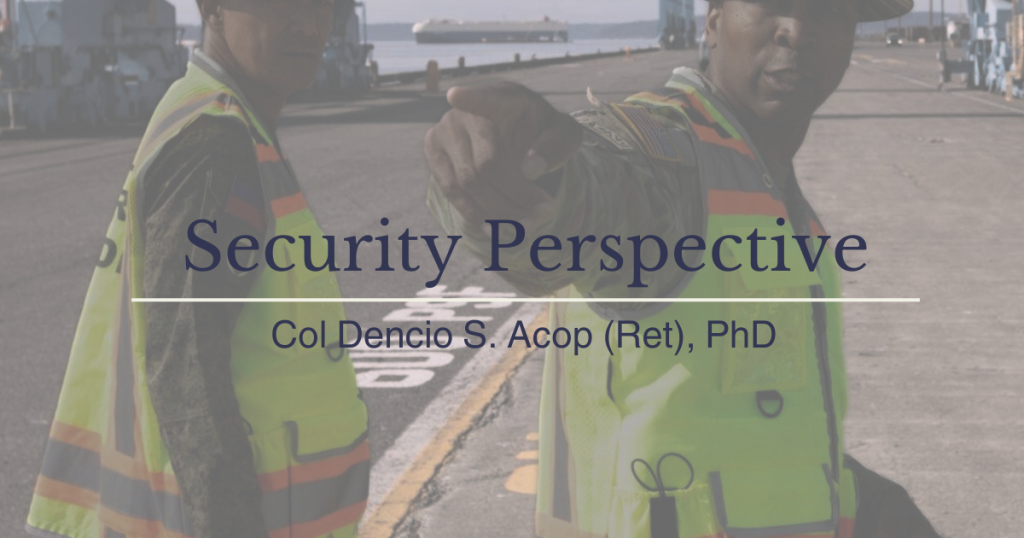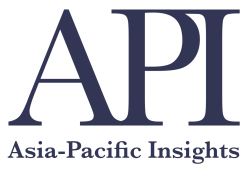Corruption is the Philippines’ Number One Enemy

By Col Dencio S. Acop (Ret), PhD, CPP | Date 06-10-2024
BOSTON, MASSACHUSETTS — The Philippines is seriously threatened by China.
This situation has been so for years and has only worsened through time. However, the number one enemy of the Philippines is corruption.
First, the departure of American forces from the archipelago ushered in the encroachment of China.
Second, compromising actions by some Philippine leaders enabled China to ‘softly’ invade the Philippines without firing a single shot.
And third, the treasonous administration of Rodrigo Duterte offered the Philippines to China on a silver platter.
Through it all, massive corruption played a key part, making it the number one threat to Philippine national security and interest.
On first note, the non-extension of the lease of American military bases in the Philippines already compromised Philippine national security to China beginning in 1991.
Up until that time, China was considered an enemy of the Philippines for various reasons.
Let us make no mistake about this. China has and still is technically inimical to Filipino security and interest.
It is only the Duterte administration that has confused this matter. For one, China has always claimed Philippine territory in the South China Sea as her own.
How can one who usurps your land and produce be your friend? Territorial invasions are one of the oldest causes of wars among nations. Hitler and Hirohito brought the world to war because of this.
Some are uncompromising over this and will not rest until they have totally regained back their land and annihilated their usurpers, real or imagined. Hamas is an example and is the arrowhead of all who wish the state of Israel wiped out off the face of the earth to ‘restore’ Arab Palestine.
For another reason, the Chinese Communist Party supported the Maoist Communist Party of the Philippines – New People’s Army (CPP-NPA) which the Armed Forces of the Philippines (AFP) has been fighting against for decades since 1968.
I was with the AFP from 1979-2009 and when I was on active duty, China and the CPP-NPA were tops in the AFP’s Order of Battle, foreign or domestic.
The decision of the Philippine government to not extend the presence of the American bases in 1991 was a strategic error in foreign policy and national security.
It was a naïve decision that would not serve the best interest of the Filipino people down the road. It assumed that powers who could replace the vacuum left by the US departure would leave the Philippines alone. The short answer to this question is the present-day reality now faced by the Philippines.
Eager for ‘total’ self-determination, Filipinos threw away the great advantage they had as the only former colony of the superpower of the world which is the reason why it was left untouched by other powers around since World War II.
I was with the Presidential Security Group when the bases were closed one after another and saw first-hand the actual closures of these bases.
I did not yet see it then more than I see it now. But the painful truth as often happens when a power vacuum is created is that the domestic elites simply wish to monopolize power for themselves under the guise of nationalism or patriotism.
In the Philippine case, this painful reality now lies before everyone’s eyes as the country witnesses the surrender of its sovereignty to China made possible by the treasonous corruption of its past leaders plain and simple.
We can also add here the equally treasonous collaboration of all who supported such leaders much like the Nazi Party enabled Hitler to destroy Germany under the guise of patriotic imperialism.
On a second note, compromising actions by some Philippine leaders enabled China to ‘softly’ invade the Philippines without firing a single shot.
It is alleged that it was during the administration of Gloria Macapagal-Arroyo when China was encouraged to embark upon its ‘soft’ invasion of the Philippines for ‘thirty pieces of silver’.
The shift in China’s foreign policy regarding the South China Sea issue appears to coincide with the election of Xi Jinping as leader of China by the Chinese Communist Party’s 12th Congress in 2013.
By the following year, China began to build artificial structures in the Spratlys. The domestic challenges of political leaders have a way of coincidentally aligning with opportunities presented by their external environments.
Wary of coup attempts from the military sector which once saddled their predecessors, Estrada and Arroyo made it a point to pamper the military during their terms. Yet, it was the same military that cut short Estrada’s reign in power.
The issue? Corruption. Arroyo served Estrada’s unserved term and got elected herself giving her a long nine years in office. But unluckily for Arroyo, the ‘Hello Garci’ scandal forced her to pamper her military leaders even more so they would not oust her as they did Estrada.
During this vulnerable time, Arroyo welcomed closer ties with China signing a memorandum of understanding that would send Filipino officers to train with the People’s Liberation Army.
Alberto Carlos was among such officers who were sent in 2008 to attend the PLA Navy Command College in Nanjing. He is the same officer who would be later assigned by President Rodrigo Duterte in 2022 to head the AFP Western Command in Palawan.
During President Arroyo’s term, a Joint Maritime Survey Undertaking was signed with China. This undertaking revealed that more than half of the seabed surveyed were within the Philippines’ Exclusive Economic Zone. The survey ship and equipment were owned by China which put the Philippines at a disadvantage unless all recorded data was actually shared with it.
On a final note, it must be said without equivocation that the treasonous administration of Rodrigo Duterte offered the Philippines to China on a silver platter.
Public leaders who still had some statesmanship left in them would at least keep their ‘sleeping with the enemy’ hidden from public view. Not Rodrigo Duterte. His public utterances are all over the place. They are in fact so direct that it leaves no room for second-guessing.
In all of Philippine history, Duterte’s term comes down as the only era whereby a sitting president allowed a foreign invader to come in and do his bidding as if he were a friend of the Filipino people.
Only despotic leaders have done what he has. It would even seem that Duterte served the interests of China more than his countrymen’s. Duterte’s record speaks for itself. Some 21,000 merely suspected and alleged drug criminals were mercilessly executed in a falsified ‘drug war’.
It is estimated that some 4.2 trillion Philippine pesos (USD 71.4 billion) were lost to corruption by the Duterte administration.
During his term, Duterte gave public pronouncements that were meant to appease a people growing weary of unabated Chinese incursions into local maritime territory.
But his actions played right into the interests of China, betraying his words.
In the end, Duterte would justify his actions claiming that it was in the nation’s interest not to anger China, which could crush the Philippines. The extent of disloyalty committed by the Duterte administration against the Filipino people in favor of China is only coming out.
But just the initial narratives of this extent are already found to be greatly disadvantageous to the national interest.
There is the influx of thousands of undocumented Chinese allegedly working for Philippine Offshore Gaming Operators. A ‘fake’ mayor of Bamban in the Central Luzon province of Tarlac who is actually a Chinese national is found out. Some 400 to 4,600 Chinese ‘students’ are suddenly in the northern Luzon province of Cagayan even if many are not actually studying or are enrolled but not attending classes and cannot speak a word of English.
The 34-hectare resort of Island Cove in Cavite converted to POGO has allegedly been bought by the Chinese for some 7 billion Philippine pesos (USD 119) and it has become a heavily guarded island fortress capable of accommodating some 20,000 occupants.
During his time, Duterte allowed the installation of DITO cell towers in local military bases and installations. Residents all over the country have been reporting the presence of many Chinese nationals (allegedly POGO workers) in various parts of the country (Metro Manila, Cebu, Iloilo, Bacolod, Davao, Boracay, Cagayan, etc.).
Recently, there have also been reported sightings in locations that are sites of the Philippines – US Enhanced Defense Cooperation Agreement (EDCA). I have earlier written that the presence of suspected PLA disguised as civilians in the northern Philippines can also be a prelude to whatever eventualities can come about from China’s plans for Taiwan.
Through much of the incursions by undocumented Chinese nationals and the seeming inability of the collective nation to reject the Chinese ‘invasion’ beginning from the very top, massive corruption has everything to do with it.
Many authors, public servants, and concerned citizens have sounded this alarm about corruption in our midst, undermining our national security, national interest, and nationhood. This is one more pitch.
I have said it before, and I am saying it again now. Corruption is the number one threat to Philippine national security. Our enemies know only too well the value of exploiting our weaknesses and those of many others whose love for money can betray even their love of God and country.
China leads the authoritarian order in the world today and challenges the moral liberal order and its international rule of law. It acts unbounded by the moral and legal order. China justifies its acts by claiming that it is not doing anything different from what powers like the United States have already done.
False narratives and corruption schemes are seen by China as simply ways and means to advance its own national interest. China has gone around the world executing these ways and means especially with smaller and poorer countries in the Asia-Pacific, South Asia, Africa, and South America regions. The impact of China’s foreign policy actions through its BRI, AIIB, and other alliance schemes can now be assessed relative to the countries it has dealt with.
But there is a stark contrast between the moral liberal order adhered to by the Philippines and the Machiavellian authoritarian order led by China. One is founded on truth. The other is founded on lies.
Tags: Security
